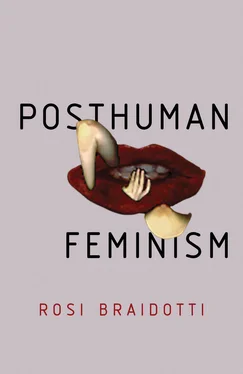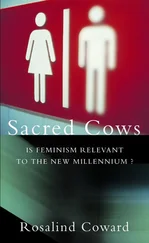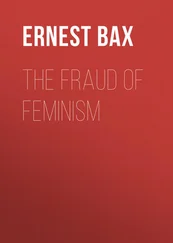1 ...7 8 9 11 12 13 ...21 The contradictions of neoliberal feminism expose the limitations of the project of equality-minded emancipation but also its enduring appeal. It is worth stressing that I recognize the necessity of continuing to pursue this project, limitations notwithstanding. In this respect, I disagree with Grosz’s assertion that recognition is not worth fighting for (Grosz, 2002). I would rather say that recognition alone is not sufficient, but it is necessary and a very good place to start from. What matters, however, is to keep on moving and not get stuck in the Master’s gaze, even in his tolerant mode (Brown, 2006).
Assuming that feminism is in its essence a transformative project, not just a reparative one, and without wishing to dismiss the often-encouraging statistics, I am worried by in-built drawbacks of equality-minded feminism, be it in their liberal, socialist or anti-racist versions. Demographic, quantitative and economic analyses of gender equality are not neutral. They are based on an implicit notion of the social subject as a liberal individualistic self. This vision assumes adherence to the dominant parameters of subjectivity, such as belonging to the dominant ethnicity, being a legal citizen, practising heterosexuality, speaking a standard language, being able-bodied and healthy and engaged in waged labour. This is hardly an inclusive understanding of what it means to be human today, even in advanced economies and democratic regimes, let alone elsewhere. All these factors police access to entitlements and advantages. They underplay the multiple systemic structures of oppression and exclusion by patriarchal, capitalist and colonial powers and how they affect the social status of marginalized others. These structures can no longer be contained within the parameters of emancipation platforms that were drawn up at a different historical stage of capitalism. Feminists today cannot speak solely in terms of access to labour, child-care or a bank account – though these issues are still unsolved. We need to broaden that range and scale of social and economic activities and assess our participation in the advancement of cognitive capitalism. This requires a change of scale and a more complex sense of time. The framework of the posthuman convergence is an urgent and necessary way of updating this political platform for feminist practices, as I will further argue in the next chapter.
Feminist Socialist Humanism: Class Equality
The flagrant contradictions of liberal feminism can leave one aghast. Like a character in Sally Rooney’s Normal People (2018), one stops and wonders at the incongruous behaviour of those most responsible for the economic and social injustices of our times. Never was so much owned by so few to the detriment of so many. In January 2019 the world’s twenty-six richest people owned as much as the poorest 50 per cent. The World’s Inequality Report co-authored by economist Piketty shows that between 1980 and 2016, the poorest 50 per cent of humanity received 12 per cent in every dollar of global income growth. By contrast, the top 1 per cent, got 27 cents of every dollar. No wonder that the widespread acceptance and mainstreaming of liberal feminism triggered a strong reaction on the Left of the political spectrum, making socialist feminism more relevant than ever.
Although socialist humanism shares with liberalism the belief in ‘Man’ as the universal emblem for all humans, it bases its political faith in structural revolutionary changes. Socialist humanism rests its revolutionary faith on the teleological idea of history that Marxism borrowed from Hegel and argues that the fulfilment of humanity’s full potential is contingent on the elimination of capitalism. Contemporary socialist feminism has inherited a close historical relationship to the political Left, but cooperation is also fraught with difficulties. People may forget, in this regard, that the second feminist wave was indeed marked by ‘a structural critique of capitalism’s androcentrism, its systemic analysis of male domination and its gender-sensitive revisions of democracy and justice’ (Fraser, 2013: 1). But it was also triggered in reaction to the sexism and bullying of the Left-wing men who had automatically elected themselves leaders of the 1960s political and cultural revolution. As Ellen Willis put it ‘The women’s liberation movement was created by women activists fed up with their subordinate position in radical organizations. Their first goal was to take on an equal active part in the radical movement instead of being relegated to secretarial and other service chores’ (2000 [1970]: 513). The Left confused the human with the male proletariat.
Confined to the classical role of handmaids – albeit of a radical community – serving food and drinks and providing sex-on-demand, 1970s feminists took a stand against Left-wing patriarchal domination and split from it. This is how feminist separatism was born and feminism turned into a revolutionary movement of its own. This foundational moment was captured by Helke Sander in the classic feminist film The Subjective Factor (1980). Using a combination of fictional and newsreel footage, the iconic filmmaker documents the sexism of Leftist male leaders and traces the origins of feminist communes. Although much has changed since the 1970s, the Marxist Left has yet to fully overcome its masculinist tradition.
Historically, the socialist feminist agenda focused on liberating women’s sexuality and reproductive labour within patriarchal capitalism. Arguing that the origins of women’s exploitation lay in the usurpation of their reproductive capacities and the appropriation of their offspring, they placed these issues at the core of their political programme. As early as 1966, British feminist Juliet Mitchell was writing on the radical force of the feminist revolution and its impact on the political Left. Combining her Marxist background with psychoanalytic theory, Mitchell produced path-breaking analyses of both the material and the psychic foundations of female sexuality (1973). Sheila Rowbotham (1973) stressed the materialist roots of the women’s revolution and the dual structure of their oppression, as the underpaid reproductive workers of the world. Postcolonial ecofeminists Mies and Shiva (1993) added the impact of colonial exploitation of both women and natural resources as key factors in primitive capitalist accumulation. By intersecting this socio-economic dimension with the analysis of persistent patriarchal and racist violence against the women, in both capitalist and colonial regimes, they moved beyond the parameters of classical Marxist analysis.
Socialist feminists reject liberal capitalist ideology because it erodes ‘the core of human essence everywhere by destroying women and nature with an unsustainable growth model’ (Mies, 2014 [1986]: 2). But they also take Marxist socialism to task for adopting a gender-neutral definition of ‘workers’, thereby concealing the active complicity between patriarchy and capitalism. Capitalism could not function without the ongoing exploitation of women’s reproductive labour, the unpaid work by farmers and colonized people, and the extraction of natural resources. To really support the liberation of women, a socialist agenda needs to be supplemented by the analysis of the sexual division of labour. Conversely, ‘the feminist movement cannot ignore the issues of class, the exploitative international division of labour and imperialism’ (Mies, 2014 [1986]: 1).
In her commentary on Mies’ work, Silvia Federici (2014) criticizes especially the process of ‘housewifization’ of women, their unpaid domestic work and the emotional work of care, and revives the Italian activist tradition of wages for housework (Della Costa and James, 1972). Federici shares Mies’ contention that capitalism accelerated the destruction of the planet’s natural wealth and the demise of the people who live closest to it. In relation to the current technological revolution, Federici argues that the real heroes of our times are not the male computer programmers, but the millions of women who are paid less than $1 a day as the labourers of the digital revolution.
Читать дальше












